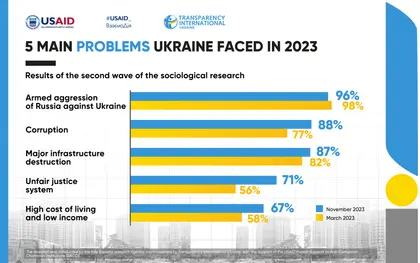The results of a recent opinion poll point to the main concerns of Ukrainians today being the armed aggression of the Russian Federation (96 percent), corruption (88 percent) and destroyed infrastructure and buildings (82 percent).
Public concern about corruption has increased by 11 percentage points compared to a previous wave of surveying back in March, whilst the two other main concerns have slightly decreased.
JOIN US ON TELEGRAM
Follow our coverage of the war on the @Kyivpost_official.
The survey findings were published by research agency Info Sapiens and commissioned by Transparency International Ukraine. The latest study is the second wave of a sociological survey among the Ukrainian population and mayors.
Surveyed Ukrainians are also increasingly concerned about problems related to the economy, such as the rising cost of living despite low incomes, and the departure of many of the working-age population from Ukraine.
"These are quite significant figures… We see that there is some concern about the state of affairs in the country, and there is a greater demand for questions that relate to the actual economic activity of the country and the future in general," explained Anastasia Mazurok, deputy executive director for operations, Transparency International Ukraine.
Internal displacement
Among internally displaced persons, the majority (63 percent) said that they plan to return home – the same as in the spring poll. However, fewer people now want to stay in the same city where they found shelter at the beginning of the war.

China, EU, Ukraine Leaders Take Davos Stage Under Trump Shadow
Factors preventing Ukrainians from returning to their hometowns are reported to be a lack of security, and potential problems with electricity and heating. Furthermore, better developed infrastructure in cities where people are temporarily sheltered has become a less significant reason to stay where they are.
Losses and rebuilding
Some 17 percent of Ukrainians have experienced war damage to property — mainly real estate. In the east of Ukraine, every second person has reportedly suffered losses, while the south ranked second in terms of the number of victims (32 percent).
The total value of losses among surveyed victims is estimated as follows:
- 41 percent between Hr. 0-100,000 (<$2,675)
- 20 percent between Hr. 101,000-1 million ($2,700 - $26,740)
- 13 percent above Hr. 1 million (>$26,740)
- 27 percent difficult to determine
The majority (65 percent) of property damage victims did not apply for compensation, with 37 percent of the view that the state has more priority needs. Furthermore, 12% believe that other people have suffered more and that the state should help them instead. Just over a quarter (26 percent) of victims did not apply for help because they did not believe they would receive it.
There are positive indicators relating to recovery, with almost half (46 percent) of Ukrainians saying that current restoration activity meets or exceeds their expectations. For residents of Kyiv, the percentage is markedly lower at 39 percent, but is higher in the eastern regions (52 percent) and northern regions (50 percent).
Every third adult Ukrainian (31 percent) knows or has seen examples of what has already been rebuilt, with almost three quarters of them (74 percent) satisfied with the result.
Financial assistance
Since the beginning of Russia’s full-scale invasion, about 42 percent of surveyed citizens have received some form of financial assistance. Most are from the eastern regions (88 percent), followed by the south (63 percent) and central Ukraine (25 percent).
Sources of assistance include:
- International funds (35 percent)
- State funds (33 percent)
- Ukrainian public organizations (25 percent).
Some 43 percent of Ukrainians identified the significant contribution of international donors to the process of Ukraine’s reconstruction.
Recovery timescales
In the spring survey, almost two thirds of Ukrainians (63 percent) expected the recovery to last more than a decade, rising to 73 percent in the recent November survey.
With respect to the economic recovery, proportions are similar, with 70 percent believing that the process will last up to ten years or more.
Almost all Ukrainians (92 percent) believe that the authorities should consult with the public on restoration issues.
Post-war reconstruction
As with the spring survey, the population continues to see corruption as the greatest threat to the restoration of Ukraine. Particular concerns include lack of control and embezzlement of funds (79 percent) and the return of corruption schemes (75 percent).
Ukrainians are also concerned about the large scale of destruction (65 percent) and the risk of a repeat of hostilities (63 percent).
Thoughts and strategies of city leaders
Main recovery criteria mentioned by city leaders:
- Having a clear and understandable concept for rebuilding and distributing funds between larger and smaller cities
- Giving due consideration to cities co-finance projects
- The need for an individualized approach to different regions and based on varying scales of destruction
- Giving due consideration to internally displaced persons when allocating funds between cities
In addition, surveyed mayors noted that, for successful recovery, they would need to:
- Attract specialists and international teams to work with communities post victory
- Obtain assistance for developing recovery strategies and supporting communities
- Acquire support from international organizations and states in the development and implementation of projects
- Return powers and funds to local authorities after the war
You can also highlight the text and press Ctrl + Enter










